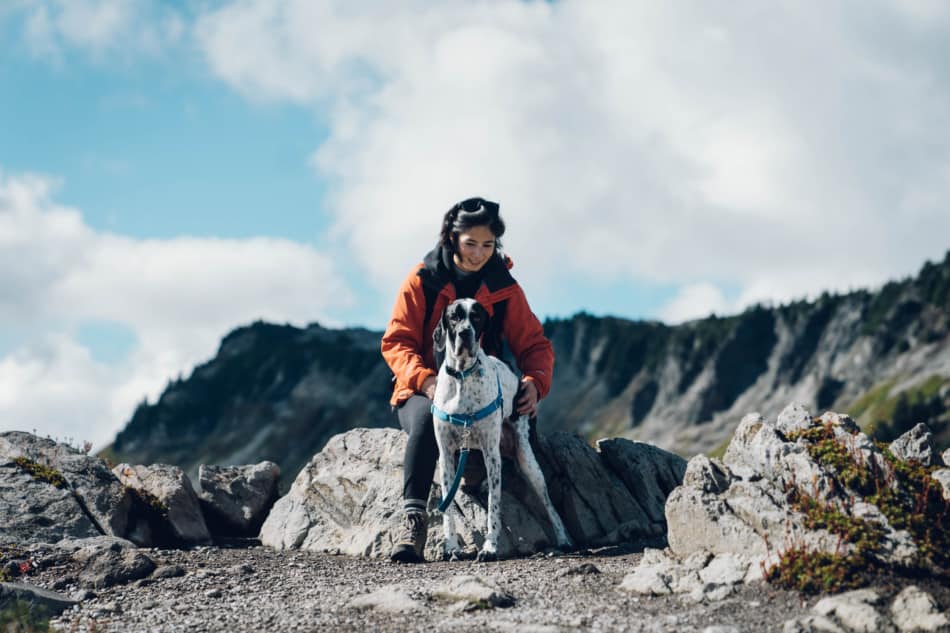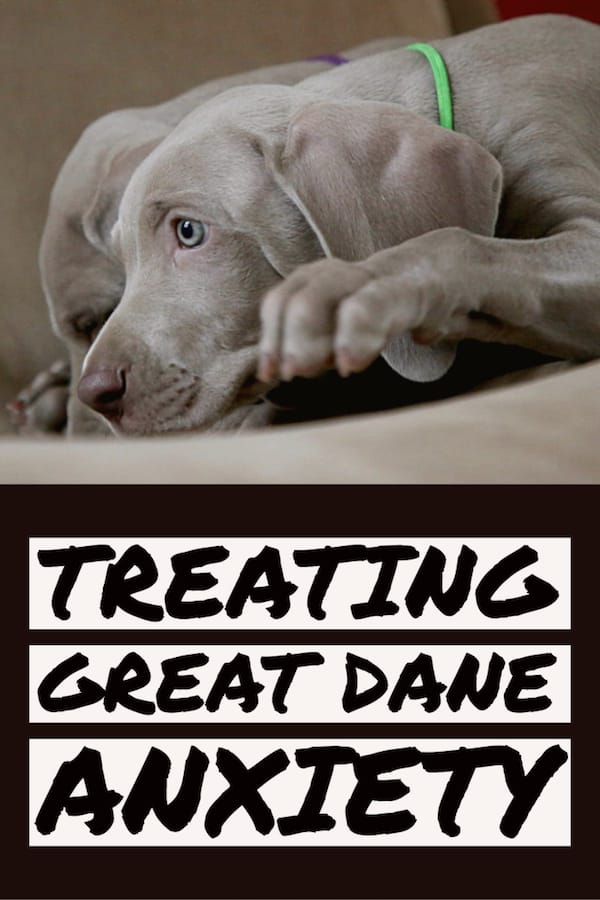
Discover effective strategies to manage and alleviate Great Dane anxiety, ensuring your gentle giant leads a calm and happy life. This article offers insights into the causes of anxiety in Great Danes and practical solutions for owners.
Table of Contents
Primary Sources of Great Dane Anxiety
Separation Anxiety
Dogs are social creatures, but Great Danes are especially dedicated to their families. While this may seem like a good thing, it also makes Great Danes more prone to separation anxiety.
Many dogs grow anxious or become upset when their owners are away, especially as puppies. Because Great Danes are so social, they can even experience separation anxiety in adulthood.
Because Great Danes are such large dogs, separation anxiety can become a big problem. Dogs experiencing separation anxiety often display destructive behavior, and a 150-pound dog can do quite a bit of damage!
Great Danes can easily chew through furniture and rip up flooring. Some even attempt to eat their way through doors and walls or jump through windows to find their owners.
Not only is this behavior incredibly frustrating and expensive, but it can also result in physical injury to the dog.
Other signs of separation anxiety include bathroom accidents, constant barking or whining, and excessive pacing or an inability to relax.
Other Possible Sources of Anxiety
- Environment – Great Dane anxiety can be brought on suddenly by changes in their environment. Your dog knows your schedule and is used to you being home at certain times during the day. If your schedule is changed by a new job or social commitment, your dog will not understand why he is left alone for longer or different periods of time.
- Moving – Moving is a stressful experience for everyone, but it can be especially upsetting for dogs. A completely new environment with different sounds and smells and an unfamiliar layout can cause anxiety in many dogs. It becomes even more stressful when it is accompanied by schedule changes and new routines.
- Loud Noises – Loud or unfamiliar noises can trigger anxiety in dogs as well. The constant noise from construction going on nearby can be intensely upsetting and worrying to your dog. Fireworks, sirens, and other loud noises can also bring on acute episodes of anxiety.
- Missing Family Members – Great Danes become attached and accustomed to the people around them. If a family member disappears, it can lead to anxiety. Dogs have no concept of growing up and going off to college. All they know is that a beloved family member is no longer around. This can turn into a stressful situation for them.
Ways You Might Be Causing Anxiety
Despite their best intentions, owners often contribute to or worsen their Great Dane’s anxiety in their attempts to help ease it.
They may unintentionally provide positive reinforcement that rewards their dogs’ anxiety or add additional stress through anger and punishments.
Sometimes, the owner is simply not meeting all of their dog’s needs.
Boredom or lack of entertainment
All dogs need some type of exercise to burn off extra energy. This varies not only by breed but even down to the individual dog.
This could mean anything from a short walk to a half-hour game of fetch followed by a two-mile run.
Adult Great Danes typically need around 30 minutes to an hour of exercise each day. By comparison, puppies and younger dogs may require up to 90 minutes of activity.
When a dog is full of energy from a lack of exercise, they can easily become anxious and restless.
Lack of exercise & play
Dogs need mental stimulation as well as physical. Boredom can lead to anxiety, especially in dogs that are left alone for long periods of time.
You wouldn’t want to sit at home with zero entertainment and no one to hang out with all day every day.
Well, neither does your Great Dane!
Bored dogs often resort to entertaining themselves, which usually results in ripped-up bedding, chewed-on furniture, and noise complaints
Puzzle toys are a great option for mental stimulation and entertainment. When your dog figures out how to open up each of the compartments, he is rewarded with a treat.
There are also toys that can be stuffed with peanut butter or other tasty snacks. These provide your Great Dane with hours of delicious fun.
Making a big deal out of departing/returning
Many owners try to soothe their dogs’ separation anxiety by giving them extra love and attention right before leaving the house and immediately on their return.
But this says to your dog that your being gone is an emotional, stressful affair!
Instead of making a big deal out of leaving, turn it into a positive, rewarding time for your dog. Try giving your dog food or treats just before you leave.
Alternatively, try having special toys that your dog only gets to play with when you are gone. Try remaining calm and unemotional when you have to leave your dog at home alone.
Doing so will make it much easier for them to remain calm as well.
Treating Great Dane Anxiety Problems
In addition to those already mentioned, there are many training tools that you can use to help curb anxiety.
Crate training is a fantastic way to help your dog feel safe and comforted. It can also help to save your house from destruction!
Start by keeping your dog in the crate for short periods of time and slowly build up to longer stretches. Make the crate a comfortable, inviting place that your dog wants to be in!
Start by filling it with cozy bedding and fun toys. You can even place a piece of your worn clothing in the crate so that it smells like you. Eventually, your dog will see the crate as his own safe space and will voluntarily go there when he needs some quiet time.
For more information on crate training, visit my dedicated article on it here.
A good way to help your dog become accustomed to and comfortable with you leaving is by desensitizing them to your going-out-the-door routine. Put on your shoes and pick up your purse or keys, then don’t go anywhere.
Repeat until these actions no longer generate anxiety in your dog. Then move to actually go out the door for just a few minutes. You can even talk through the door to your dog to reassure him that you haven’t left.
Slowly increase the amount of time you are gone as your dog becomes more comfortable with being alone.
Where To Go For Help
Sometimes these options are not enough, in which case, you need to seek out the help of experts.
Your dog may benefit from the help of a professional trainer who has experience dealing with dogs who suffer from excessive anxiety.
Medications are also available to provide relief from severe stress and anxiety. One such approach that has increased in popularity over the last several years is the use of CBD oil.
For more information about how CBD oil could help your Great Dane’s anxiety, take a look at my article here.
Professional Trainer
A good trainer can not only help your dog become calmer and happier, but they can also teach you how to better manage your dog’s anxiety.
Professional trainers can help determine the specific triggers that cause your dog to become stressed.
They have the knowledge and tools to desensitize your dog to the things that upset them and help relieve their anxiety.
Veterinarian
If your dog is suffering from anxiety, especially if it seems to have come out of nowhere, a trip to the vet could be a good idea. Anxiety can be a symptom of an illness or injury.
Your vet can determine if there is an underlying physical reason for your dog’s anxious behavior.
If your dog’s anxiety persists, despite corrective training, you can talk to your vet about management with medication. Clomicalm is an FDA-approved treatment for anxiety in dogs, and the tablets help relieve anxiety without sedation or personality changes.
There are also several natural options shown to be effective in treating anxiety. Let your vet help determine the best treatment method for your dog.
Conclusion on Great Dane Anxiety
Any dog can experience anxiety, but Great Danes are especially susceptible. However, there is no need for you and your dog to suffer! There are many training tools and options to treat Great Dane anxiety and the negative behaviors that often come with it.
If your dog’s anxious behavior is not alleviated by at-home training methods, there are professionals who can help your dog gain confidence and overcome their anxiety.


My fog has stopt going out she is fritend of every noies on the st.
Dhe shakes from head to toe.
Will not leave my side.
I just want my old dog back
Hello
My boy gets shivers all of a sudden in his sleep , this is happening for a few months now also he hasn’t been eating from last night
He’s sleeping right now , he seems okay but has a little bit of fever
I’m really worried, please tell me what to do
Hello!
We just rescued a 8+week-old Great Dane we named Ulla.Her first human realized he was in over his head and brought her to Dallas Pets Alive when she was six weeks old. Her foster home environment (she was there for two+ weeks) had been a very good experience. The foster family have fostered over 80 cats & dogs over the last ten years, plus have six dogs of their own. Ulla went into her crate at night for about seven hours. She got along with all the other pets & foster animals. She only went into her crate when the foster parents were doing their foster parent work out of the house. We had to be interviewed at our home with her & that went wonderfully. We have had anywhere from one to three dogs (German Shepherd, Great Pyrenees, Australian Shepherd/Great Pyrenees mix, Coonhound/Doberman mix & Golden Retriever) for the last 25 years. We had to put down two dogs last year, both 14+ years old. We have had the 6YO German Shepherd (Zelda) & the 2YO Great Pyrenees (Dotty) living with us until two weeks ago when my son moved & took them with him. Zelda is his baby & Dotty is her best buddy. I have wanted to rescue a Great Dane for many years but was waiting until she would be our only dog that I could give my full attention to. I researched & knew that they don’t need a lot of exercise & make great apartment dogs because they are basically coach potatoes after two+ years. We like big dogs & knew what to expect with size, appetite, etc. but hadn’t read or ever heard anyone mention separation anxiety being common/a possibility. I’m 56 & live with my husband on a hobby farm in Greenville Texas. I don’t work but am gone for five hours every Tuesday for a standing doctor appointment in Dallas. The foster mom said Ulla would be fine in her crate for that amount of time during the day, so I was sure she’d be ok. My son can come over to let her out & visit with her if I have to be gone for more than two hours at a time. We live in prairieland, so going to other towns at least 45 minutes away is a must… Anyway, Ulla is tied to my hip & im used to that because my Aussie/PYR was, as was my golden. I spend lots of time with her outside and plenty of playtime with her inside, as well as training her basics at the same time. I don’t expect a little spud who never has accidents, but I’m concerned that she is going through separation anxiety even if I leave her to be in another room off-limits to her for only a few minutes. Her first night in the crate which I packed with a soft, thick white towel & a chew toy went fine. She was upset as most pups are the first night-in a totally different home- but the barking ceased after about 10 minutes & she went through the night for about six hours. She has peed every time she’s been in the crate & that is more than any of our other pups did at her age. The next night she was up barking at 3am & my husband took her out where she peed & pooped. She has been very regular with her eliminating, so I was surprised (& a little frustrated w/ hubby for letting her out because she had done her business at 10pm & was supposedly crate trained). Twice now I have brought her into bed with me (sheer exhaustion) & she settled right away & fell asleep. We never let our dogs sleep with us, but I was desperate. She slept on the couch with my husband for a few hours twice now. I’ve read your article on separation anxiety and will put one of my sweaty t-shirts in her crate, along with her favorite chew toy. I just don’t want to set her, or us up for disaster. I’ve had friends with dogs with separation anxiety that have broken through windows, broken out of metal crates, chewed through walls, etc. Most ended up medicating them, to which I am not opposed if necessary-especially since I suffer from depression & anxiety and have to take medication. Obviously we don’t want to go that route unless absolutely necessary. I was just was looking for any feedback from my novel… We love Ulla & I would have asked my vet (who is amazing) but unavailable to talk for the next three days, so I thought I’d pick your brain… Ulla & I thank you in advance for any insight you can give…☺️?
This is a topic that is near to my heart… Thank you! Where are your contact details though?
Hi Zach I need some advice can you please email me about my Great Dane.
There is certainly a lot to find out about this subject. I love all of the points you ave made.
I cannot thank you enough for the article.Really thank you! Keep writing!
Enjoyed every bit of your blog.Really looking forward to read more. Great.
My Dane has severe anxiety and it’s getting worse and worse. He is scared of everything and now has taken to peeing on furniture his beds, my bed, floor, garage etc. I’ve tried every med there is and CBD oil as well. I either have to Sedate him constantly or
He’s miserable and peeing everywhere he’s been to the vet and
Has no medical concerns He’s fully trained and receives nothing but top care , he has a sister and is never alone. I’m at my witts end he’s miserable and
I’m considering putting him down.
Does anyone have any thoughts please 😢🙏🏼
my 10 month female great Dane has recently been very down and lost some apatite kindly advise
email below
[email protected]
Hi I have a Great Dane going on 7 monthd old she is terrible eats walls furniture con dad tangly barks at us jumps up on us and it hurts too. We have raised 2 Great Danes before and never had as much problems as with this one. Please help us it.is running our’er marriage my husband wants to get rid of her and I would if I knew she was not mistreated and loved. I want to keep her but I am afraid that she’s gonna get worse and affraid for my marriage. Please help me are someone to help that doesn’t cost hundreds of dollars please help us
Hello! I just found this blog. How is the pup doing now ?
I assume she’s little over a year now. Do you still have her ?
we have a great dane puppy, he does not want to meet new people
he tries to run away and hide or he growls/barks and tries to hide, he is 14 weeks old and has been this way since we brought him home at 9 weeks, we have him signed up for a fearful/shy puppy class but it doesnt begin until Oct,
any suggestions on how to help him,